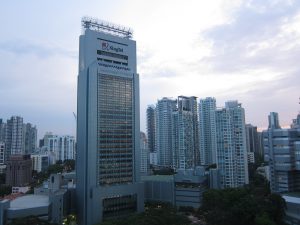In 2019, the Monetary Authority of Singapore (MAS) began accepting applications for digital banking licenses, shortlisting the top 14 contenders in June 2020. One of the eligibility requirements was that at least one partner in any group applying for a license should have a minimum three years of experience in the tech or e-commerce sector. This was a tacit sign from regulators that tech start-ups were ready to be fully integrated into Singapore’s large financial sector.
In early December, MAS announced it was awarding one full digital banking license to a partnership between Singtel and Grab, and another to Sea Limited, a home-grown tech giant and parent company of e-commerce platform Shopee. Wholesale digital banking licenses were granted to China’s Ant Group, as well as a consortium backed by the Chinese state-owned real estate company Greenland Group.
Full banking licenses confer the right to engage in all banking activities including retail banking, while a wholesale license limits activity to the corporate, small and medium business sectors. These digital banks will not have traditional brick and mortar branches, but will market their services and operate their businesses almost exclusively online.
This helps explain why partnering with telecom giant Singtel gave Grab a very good chance at securing one of the licenses. As the success of cash transfer service M-Pesa demonstrated in Kenya, piggybacking on the existing mobile penetration of a dominant telecom is one of the fastest and most efficient ways to get digital financial services out to customers.
Singtel has 4.3 million customers in Singapore, and 50.4 percent of the mobile market share. Couple that digital infrastructure with Grab’s ability to serve a wide range of consumer needs, and the pairing was a natural one. Some day in the near future Singtel customers may be able to order food, pay for rides, and apply for loans from the Grab app on their phone.
Looking beyond Singapore’s borders, Singtel has a significant presence throughout the region, particularly in Australia, where its wholly owned subsidiary Optus has 10.4 million customers. It also has partial ownership stakes in major telecoms in Indonesia, the Philippines, and Thailand, among other nations. This doesn’t mean a Grab-Singtel partnership is going to take the region’s fintech scene by storm, but securing a full digital banking license in a financial nerve center like Singapore is an important first step.
All of these newly licensed digital banks will be facing an uphill battle against Singapore’s entrenched traditional banking sector. The three largest banks – DBS, UOB and OCBC – had a combined 1.475 trillion Singaporean dollars ($1.1 trillion) in assets at the close of 2019, and millions of existing customers, many of whom already use digital and online banking services. Will fusing Singtel’s mobile penetration with Grab’s array of consumer-facing services be enough to woo customers away from the massive brick and mortar banks with their established customer bases? That will be one of the key stories to watch.
The digital economy in Southeast Asia is booming. According to a report from Google and Temasek, in 2020 the estimated number of internet users in the region hit 400 million, and the value of online transactions is expected to reach $300 billion by 2025. The race is on between investors, businesses, and governments to figure how best to secure a piece of this rapidly expanding pie.
But building the digital infrastructure and regulating the provision of financial services is a more complex task than creating ride-hailing and e-commerce platforms. There are huge incumbents with very deep pockets in the financial sector, and they are unlikely to cede market share as easily as a local taxi company. Moreover, banks are subjected to far stricter scrutiny as inadequate capital reserves or loan underwriting standards can pose a systemic threat to national economies.
Fast-growing tech start-ups like Grab have been accustomed to explosive growth underwritten by huge inflows of venture capital even as they lose money. Moving fast and breaking things might be an acceptable mantra for a tech start-up looking to shake up transportation or the retail sector. But that kind of disruptive innovation is less welcome in the banking industry. This announcement from MAS brings some clarity as to who the major players will be in Singapore’s digital banking race. How they will deal with these critical issues remains to be seen.

































